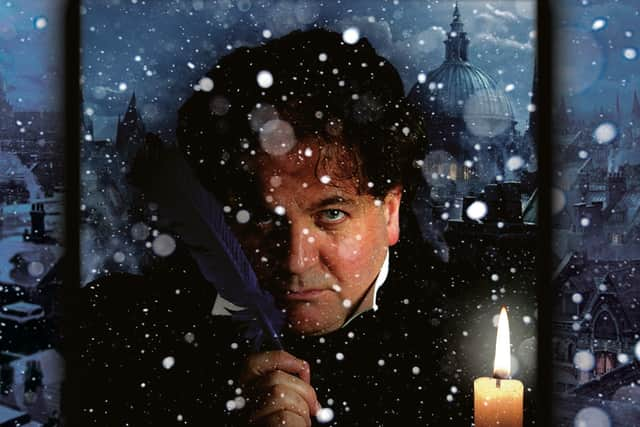Alex Kane: Christmas matters but it’s alright not to like it


And I think that is probably just as true for many who value Christianity above all else in their lives and are affronted by what often resembles a taking over the Temple with tinsel and trinkets. Yet not liking Christmas is still regarded as a personality defect; a defect that renders you mean, avaricious, uncaring and deaf to the needs and concerns of your fellow citizens.
To even hint that you don’t like Christmas is to be greeted with a chorus of ‘Bah! Humbug!’ and dismissed as an ‘Old Scrooge.’ Ironically, most of those who so respond have never fully understood the deep and very personal story of redemption at the heart of A Christmas Carol; a story that most of them have probably never read.
Advertisement
Hide AdAdvertisement
Hide AdThe lesson of A Christmas Carol isn’t about celebrating Christmas with booze, office parties, over-eating and slumping in front of a TV or computer screen. It’s about learning lessons from your own life, acknowledging your flaws and changing your approach. It’s about an annual pause for reflection and a steer for the way ahead. In other words, it’s never too late to do things differently.


“I will honour Christmas in my heart, and try to keep it all of the year. I will live in the Past, the Present and the Future. The Spirits of all Three shall strive within me. I will not shut out the lessons that they teach. Oh, tell me I may sponge away the writing on this stone”. Scrooge was better than his word. He did it all and infinitely more; and to Tiny Tim, who did not die, he was a second father. He became as good a friend, as good a master, as good a man as the good old city knew, or any other good old city, town or borough in the good old world. Some people laughed to see the alteration in him, but he let them laugh, and little heeded them; for he was wise enough to know that nothing ever happened on this globe, for good, at which some people did not have their fill of laugher at the outset.
The interesting thing about that passage, coming after Scrooge’s encounter with the third Spirit, is that it doesn’t require a belief in any religion, let alone Christianity. It is about fundamental humanity and decency and is just as relevant to an atheist like me as it is to my friends who do have religious beliefs.
In precisely the same way that a pet isn’t just for Christmas, nor is Scrooge’s message. The lesson learned that night didn’t end on the Twelfth Day of Christmas. It lasted for the rest of his life. It affected everything he did afterwards. It made him a stronger, better person; the sort of person who didn’t care if people laughed at him. The Scrooge who had abandoned others and lived without them, found a way back to them.
Advertisement
Hide AdAdvertisement
Hide AdGeorge Bailey, from It’s A Wonderful Life, believed that he had been abandoned by others and saw suicide as his only option. Nothing made sense to him. He believed he had no worth, no purpose, no need to exist. And when he tumbled from the bridge, into the river, that’s when Clarence, an angel trying to earn his wings, came to the rescue. He took him on a journey similar to Scrooge’s encounter with the past, present and future: “Strange, isn’t it? Each man’s life touches so many other lives. When he isn’t around he leaves an awful hole, doesn’t he? You see, George, you’ve really had a wonderful life. Don’t you see what a mistake it would be to throw it all away?” Bailey, who believed others had abandoned him and decided that their rejection meant there was no point to his life, found a way back to them.
And maybe that’s the central message of both these stories: for many – probably far more than we’ll ever realise – it’s about finding a way back from personal demons and setbacks. That journey back, which often involves a personal redemption of some sort, cannot be made alone. In fiction the return journey is often steered by spirits, angels, ghosts. It real life it requires ordinary people; albeit doing extraordinary work in homelessness, mental health, addiction, loneliness and assorted reaching-out-in-one-way-or-another charities. Ordinary people being there to try and catch those falling from a bridge.
I know what it’s like to be caught. By adoptive parents who took huge risks in taking responsibility for a frightened, untrusting, nightmare-scarred, traumatised child. By people who later rescued me from a very dark period in my life when I was enveloped in a crippling depression. And by a partner who saw some sort of inner light and led me to a world of unconditional love, wonder and the mountainous joy of my children. I’ve been extremely lucky.
It’s ok not to like Christmas. But it’s not ok to make people feel bad for not liking it. It’s not ok to keep pumping out the message that spend, spend, spend trumps personal reflection and learning lessons from our own lives, especially the debt of care we owe to others who are clearly struggling as much on every other day of the year as they do on Christmas Day.
Advertisement
Hide AdAdvertisement
Hide AdChristmas Day matters, for all sorts of reasons. I used to hate it, but then I got lucky; and nowadays I love it. So, my best wishes to all of you, however, wherever and with whom you spend Christmas. For those of you feeling abandoned take comfort in the fact that there are people waiting to help you. Every life matters.